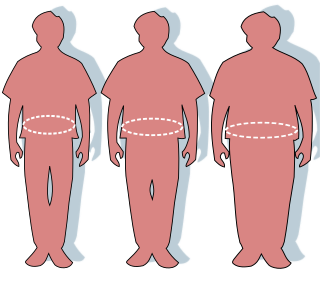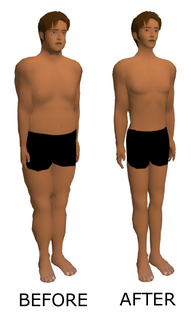Related Research Articles
Dieting is the practice of eating food in a regulated and supervised fashion to decrease, maintain, or increase body weight, or to prevent and treat diseases, such as diabetes. A restricted diet is often used by those who are overweight or obese, sometimes in combination with physical exercise, to reduce body weight. Some people follow a diet to gain weight. Diets can also be used to maintain a stable body weight and improve health.

Obesity is a medical condition in which excess body fat has accumulated to an extent that it may have a negative effect on health. People are generally considered obese when their body mass index (BMI), a measurement obtained by dividing a person's weight by the square of the person's height, is over 30 kg/m2; the range 25–30 kg/m2 is defined as overweight. Some East Asian countries use lower values. Obesity increases the likelihood of various diseases and conditions, particularly cardiovascular diseases, type 2 diabetes, obstructive sleep apnea, certain types of cancer, osteoarthritis, and depression.

Weight loss, in the context of medicine, health, or physical fitness, refers to a reduction of the total body mass, due to a mean loss of fluid, body fat or adipose tissue or lean mass, namely bone mineral deposits, muscle, tendon, and other connective tissue. Weight loss can either occur unintentionally due to malnourishment or an underlying disease or arise from a conscious effort to improve an actual or perceived overweight or obese state. "Unexplained" weight loss that is not caused by reduction in calorific intake or exercise is called cachexia and may be a symptom of a serious medical condition. Intentional weight loss is commonly referred to as slimming.

Low-carbohydrate diets or carbohydrate-restricted diets (CRDs) are diets that restrict carbohydrate consumption. Foods high in carbohydrates are limited or replaced with foods containing a higher percentage of fats and moderate protein and other foods low in carbohydrates, although other vegetables and fruits are often allowed.

Adipocytes, also known as lipocytes and fat cells, are the cells that primarily compose adipose tissue, specialized in storing energy as fat. Adipocytes are derived from mesenchymal stem cells which give rise to adipocytes, osteoblasts, myocytes and other cell types through adipogenesis.

Ghrelin, the "hunger hormone", also known as lenomorelin (INN), is a peptide hormone produced by ghrelinergic cells in the gastrointestinal tract that functions as a neuropeptide in the central nervous system. Besides regulating appetite, ghrelin also plays a significant role in regulating energy homeostasis.
Wellspring Academies is a pair of therapeutic boarding schools for overweight and obese children, teens, and young adults, both operated by Wellspring, a division of Aspen Education Group. It is said to be the first weight loss boarding school in the United States.
Very low calorie diet (VLCD), or sometimes called starvation diet, is a diet with very or extremely low daily food energy consumption. It is defined as a diet of 800 kilocalories (3,300 kJ) per day or less. VLCDs are formulated, nutritionally complete, liquid meals containing 800 kilocalories or less per day. VLCDs also contain the recommended daily requirements for vitamins, minerals, trace elements, fatty acids and protein. Carbohydrate may be entirely absent, or substituted for a portion of the protein; this choice has important metabolic effects. The VLCD products are usually a powder which is mixed with water or another low-food-energy liquid. The VLCD is prescribed on a case to case basis for rapid weight loss in people with body mass index (BMI) of 30 and above. The health care provider can recommend the diet to a patient with a BMI between 27 and 30 if the medical complications the patient has due to being overweight present serious health risks. It results in 4% more weight loss over the short term as compared to control.

TOPS Club, Inc. is a non-profit charitable corporation based in Milwaukee, Wisconsin, United States, having members in chapters located worldwide, the majority of them in the United States and Canada. Its twofold objective is to sponsor research and foster support groups in human body weight control. Most members refer to the organization simply as "TOPS", an acronym for "Take Off Pounds Sensibly."

Oleoyl-estrone (OE), or estrone 3-oleate, is a fatty acid ester of estrone. It is a naturally circulating hormone in animals, including humans. It was studied as a potential weight-loss drug, but failed to show benefit in clinical trials. It was first reported in 1996 to cause a body fat loss effect in rats in the International Journal of Obesity and Related Metabolic Disorders. The animal research has all been conducted by the Nitrogen-Obesity Research Group of the University of Barcelona.
Bariatric surgery includes a variety of procedures performed on people who have obesity. Weight loss is achieved by reducing the size of the stomach with a gastric band or through removal of a portion of the stomach or by resecting and re-routing the small intestine to a small stomach pouch.

George L. Blackburn was the S. Daniel Abraham Professor of Nutrition and Associate Director of the Division of Nutrition at Harvard Medical School. He was also Director of the Center for the Study of Nutrition Medicine (CSNM) in the Roberta and Stephen R. Weiner Department of Surgery, and Director of the new Feihe Nutrition Laboratory at Beth Israel Deaconess Medical Center (BIDMC), Boston, Massachusetts.
The Harris–Benedict equation is a method used to estimate an individual's basal metabolic rate (BMR).

HMR, formerly known as Health Management Resources, is a part of Merck & Co. that offers weight management programs that combine a structured diet, physical activity, and lifestyle-change coaching. It was founded as a separate company in 1983, and has provided its programs to U.S. hospitals, medical centers, provider groups, and health systems. More recently, HMR introduced a self-directed program that participants can access online with the option of coaching support by phone.
Wellspring Camps are a group of children's health and wellness camps located in California and Florida. The camp focuses on changing behavior and eating patterns in order to create long-term healthy lifestyles for participants. Due to "economic feasibility" Wellspring Camps is not currently operating. However, the camp previously operated in La Jolla, California and Melbourne, Florida.
The South Beach Diet is a popular fad diet developed by Arthur Agatston and promoted in a best-selling 2003 book. It emphasizes eating food with a low glycemic index, and categorizes carbohydrates and fats as "good" or "bad". Like other fad diets, it may have elements which are generally recognized as sensible, but it promises benefits not backed by supporting evidence or sound science.
Management of obesity can include lifestyle changes, medications, or surgery. The main treatment for obesity consists of dieting and physical exercise. Diet programs may produce weight loss over the short term, but maintaining this weight loss is frequently difficult and often requires making exercise and a lower calorie diet a permanent part of an individual's lifestyle. Success rates of long-term weight loss maintenance with lifestyle changes are low, ranging from 2 to 20%. Dietary and lifestyle changes are effective in limiting excessive weight gain in pregnancy and improve outcomes for both the mother and the child. The National Institutes of Health recommend a weight loss goal of 5% to 10% of the person's current weight over six months.

Eat Smart, Move More, Weigh Less is a 15-week adult weight management program that uses strategies based on evidence for weight loss and/or weight maintenance. The Eat Smart Move More Weigh Less classes focus on the 12 evidence-based eating and physical activity behaviors for weight management. The program does not provide a prescriptive diet plan, it teaches small lifetime changes. The program teaches mindfulness as a strategy to become more aware of eating and physical activity. Eat Smart, Move More, Weigh Less includes methods for planning and tracking healthy eating and physical activity behaviors. In 2007, Eat Smart, Move More, Weigh Less curriculum was developed by a writing team from NC State University and NC Division of Public Health. A complete listing of authors and their respective affiliations can be found on the program website. The 15-lesson curriculum was peer reviewed by state and local nutrition and physical activity professionals, representatives from the medical community, and a CDC project officer.
George A. Bray is an American obesity researcher. As of 2016, he is a University Professor emeritus and formerly the chief of the division of clinical obesity and metabolism at Louisiana State University's Pennington Biomedical Research Center (PBRC) in Baton Rouge. He is also a Boyd Professor emeritus at PBRC, and a professor of medicine emeritus at the Louisiana State University Medical Center.
Rena R. Wing is recognized for her well-established research on behavioral treatments of obesity. Dr. Wing's research examined positive outcomes for long-term weight loss as well as halting weight gain in individuals who are currently overweight. This led to an important development in Wing's research which was the layout of a lifestyle intervention for those with diabetes, particularly type 2.
References
- ↑ NWCR Facts: http://nwcr.ws/Research/default.htm
- ↑ NWCR Facts: http://nwcr.ws/Research/default.htm